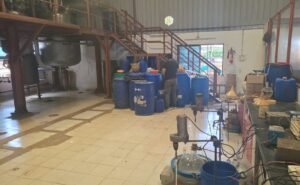Maharashtra police forces conducted their largest narcotics operation in recent years during a coordinated factory raid across state borders. The unprecedented seizure netted drugs valued at approximately Rs 12000 crore from a sophisticated manufacturing facility. This massive bust represents one of India’s biggest drug enforcement operations targeting synthetic narcotic production networks.
Breaking Down the Historic Drug Bust Operation
The multi-agency operation involved careful planning and intelligence gathering over several months before the actual raid commenced. Maha police units worked closely with Telangana authorities to ensure comprehensive coverage of all facility access points. Specialised drug enforcement teams discovered large-scale manufacturing equipment designed for producing synthetic narcotics in industrial quantities.
Officers found various types of illegal substances, including methamphetamine, synthetic opioids, and designer drugs, targeting urban markets. The facility operated under the guise of a legitimate pharmaceutical manufacturing plant to avoid suspicion. Advanced laboratory equipment worth millions enabled the production of high-purity narcotics destined for domestic and international distribution.
The raid revealed sophisticated packaging and distribution systems that could have supplied drugs across multiple states. Evidence suggests this operation had been running for several years while maintaining a legitimate business facade.
Scale and Scope of the Manufacturing Operation
The sheer scale of this drug manufacturing facility shocked even experienced law enforcement officers who conducted the raid. Production capacity estimates suggest the factory could generate hundreds of kilograms of synthetic drugs monthly. This output level indicates a massive distribution network spanning multiple regions across India.
Key discoveries during the raid included:
- Industrial-grade chemical processing equipment worth crores
- Raw materials sufficient for months of continuous production
- Finished drug products are ready for market distribution
- Sophisticated packaging systems mimicking legitimate pharmaceuticals
- Financial records indicating extensive money laundering operations
The facility’s location in Telangana provided strategic advantages, including proximity to major transportation networks and industrial infrastructure. Remote positioning helped avoid regular scrutiny while maintaining access to necessary resources and skilled personnel.
Multi-State Coordination Leads to Success
This operation demonstrates the growing cooperation between different state police forces in combating interstate drug trafficking networks. Maha police intelligence units first identified suspicious activities through routine financial monitoring and informant networks. Subsequent investigations revealed connections to manufacturing facilities operating across state boundaries.
Telangana authorities provided crucial local knowledge and logistical support that proved essential for the operation’s success. Joint task forces coordinated simultaneous raids to prevent evidence destruction or suspect flight from the area. Advanced surveillance technology helped monitor the facility for weeks before the final enforcement action.
The seamless cooperation between Maharashtra and Telangana police units serves as a model for future interstate drug enforcement operations. Information sharing protocols established for this case will likely be adopted for similar investigations nationwide.
Economic Impact of This Major Drug Network
The Rs 12000 crore valuation reflects not just the seized drugs but also the broader economic impact. This network likely generated substantial illegal profits while funding additional criminal activities across multiple states. Money laundering operations associated with drug sales often corrupt legitimate business sectors and financial institutions.
Tax evasion from illegal drug sales represents significant revenue loss for both state and federal governments nationwide. The seized assets could potentially be redirected toward legitimate economic development and social programs after legal proceedings conclude. Local communities also benefit from reduced drug availability and associated criminal activities.
Manufacturing operations of this scale require substantial investment in equipment, facilities, and personnel coordination. The disruption of this network prevents reinvestment of illegal profits into expanding drug production capabilities further.
Health and Social Implications for Communities
Synthetic drugs manufactured in facilities like this one pose severe health risks for users across urban and rural areas. Quality control in illegal manufacturing often lacks proper safety protocols, resulting in dangerous chemical compositions. Emergency rooms frequently treat overdoses from synthetic drugs containing unknown additives and varying potency levels.
The availability of cheap, high-purity synthetic drugs contributes to addiction epidemics affecting young adults disproportionately. Educational institutions report increasing problems with student drug abuse linked to easily accessible synthetic substances. Treatment facilities struggle to address addiction patterns associated with designer drugs and synthetic opioids.
Community safety improves significantly when major drug manufacturing operations face disruption through effective law enforcement actions. Reduced drug availability often correlates with decreased property crimes and violent incidents related to drug trafficking activities.
Legal Proceedings and Future Implications
Multiple arrests were made during the factory raid including key personnel involved in production, distribution, and financial operations. Suspects face serious charges under the Narcotic Drugs and Psychotropic Substances Act, carrying lengthy prison sentences. Asset forfeiture proceedings will target properties and financial accounts linked to this criminal enterprise.
Court proceedings will likely reveal additional details about the network’s operations and connections to other criminal organisations. Evidence gathered during the raid could lead to further investigations targeting suppliers, distributors, and money laundering operations. International cooperation may be necessary if evidence reveals export operations to foreign markets.
The success of this operation will likely encourage expanded multi-state cooperation in drug enforcement efforts nationwide. Enhanced intelligence sharing and joint operations could become standard practice for addressing sophisticated criminal networks operating across state boundaries.
Moving Forward: Strengthening Drug Enforcement
This historic seizure highlights both the scale of India’s drug manufacturing problem and the effectiveness of coordinated law enforcement responses. Investment in advanced detection technology and specialized training programs will be essential for identifying future operations. Community engagement and public awareness campaigns also play crucial roles in preventing drug manufacturing facilities from establishing operations.
The Telangana case demonstrates that even sophisticated criminal operations remain vulnerable to determined law enforcement efforts with proper resources and coordination.








Be First to Comment